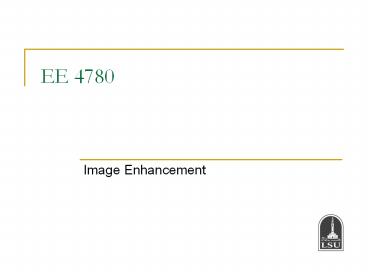EE 4780 - PowerPoint PPT Presentation
Title:
EE 4780
Description:
EE 4780 Image Enhancement Image Enhancement Image Enhancement by Point Processing Image Enhancement by Point Processing Image Enhancement by Point Processing Image ... – PowerPoint PPT presentation
Number of Views:93
Avg rating:3.0/5.0
Title: EE 4780
1
EE 4780
- Image Enhancement
2
Image Enhancement
- The objective of image enhancement is to process
an image so that the result is more suitable than
the original image for a specific application. - There are two main approaches
- Image enhancement in spatial domain Direct
manipulation of pixels in an image - Point processing Change pixel intensities
- Spatial filtering
- Image enhancement in frequency domain Modifying
the Fourier transform of an image
3
Image Enhancement by Point Processing
- Intensity Transformation
4
Image Enhancement by Point Processing
- Contrast Stretching
5
Image Enhancement by Point Processing
- Contrast Stretching
6
Image Enhancement by Point Processing
- Intensity Transformation
Matlab exercise
7
Image Enhancement by Point Processing
- Intensity Transformation
8
Image Enhancement by Point Processing
- Intensity Transformation
9
Image Enhancement by Point Processing
- Gray-Level Slicing
10
Image Enhancement by Point Processing
- Histogram
255
0
11
Histogram Specification
- Intensity mapping
- Assume
- T(r) is single-valued and monotonically
increasing. - The original and transformed intensities can be
characterized by their probability density
functions (PDFs)
12
Histogram Specification
- The relationship between the PDFs is
- Consider the mapping
Cumulative distribution function of r
Histogram equalization!
13
Image Enhancement by Point Processing
- Histogram Equalization
14
Image Enhancement by Point Processing
- Histogram Equalization Example
- Intensity 0 1 2 3
4 5 6 7 - Number of pixels 10 20 12 8 0 0
0 0 - Intensity 0 1 2 3
4 5 6 7 - Number of pixels 0 10 0 0 20 0
12 8
15
Image Enhancement by Point Processing
- Histogram Equalization
16
Histogram Specification
17
Histogram Specification
18
Histogram Specification
19
Histogram Specification
20
Local Histogram Processing
- Histogram processing can be applied locally.
21
Image Subtraction
The background is subtracted out, the arteries
appear bright.
22
Image Averaging
Corrupted image
Original image
Noise
Assume n(x,y) a white noise with mean0, and
variance
If we have a set of noisy images
The noise variance in the average image
is
23
Image Averaging
24
Spatial Filtering
A low-pass filter
A high-pass filter
25
Spatial Filtering
- Median Filter
Sort (10 10 10 20 25 75 85 90 100)
- Example
Original signal
100 100 100 100 10 10 10 10 10
Noisy signal
100 103 100 100 10 9 10 11 10
Filter by 1 1 1/3
101 101 70 40 10 10 10
Filter by 1x3 median filter
100 100 100 10 10 10 10
26
Spatial Filtering
- Median filters are nonlinear.
- Median filtering reduces noise without blurring
edges and other sharp details. - Median filtering is particularly effective when
the noise pattern consists of strong, spike-like
components. (Salt-and-pepper noise.)
27
Spatial Filtering
SaltPepper noise added
Original
3x3 averaging filter
3x3 median filter
28
Spatial Filtering
29
Wiener Filter
Noisy image
Original image
Noise
Wiener Filter
Noise variance
Signal variance
30
Wiener Filter
is estimated by
Since variance is nonnegative, it is modified as
Estimate signal variance locally
N
N
31
Wiener Filter
Denoised (3x3neighborhood) Mean Squared Error is
56
Noisy, ?10
wiener2 in Matlab
32
Spatial Filtering
- Gradient Operators
- Averaging of pixels over a region tends to blur
detail in an image. - As averaging is analogous to integration,
differentiation can be expected to have the
opposite effect and thus sharpen an image. - Gradient operators (first-order derivatives) are
commonly used in image processing applications.
33
Spatial Filtering
- Gradient Operators
These are called the Sobel operators
34
Spatial Filtering
- Laplacian Operators
- Laplacian operators are second-order derivatives.
35
Spatial Filtering
36
Spatial Filtering
- High-boost or high-frequency-emphasis filter
- Sharpens the image but does not remove the
low-frequency components unlike high-pass
filtering
37
Spatial Filtering
- High-boost or high-frequency-emphasis filter
- High pass Original Low pass
- High boost (Original) K(High pass)
38
Spatial Filtering
A high-pass filter
A high-boost filter
39
Spatial Filtering
- High-boost or high-frequency-emphasis filter
40
Spatial Filtering































